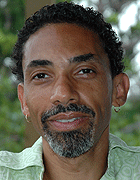Robin D.G. Kelley, Ph.D., one of the country’s pre-eminent scholars in African-American history, will serve as a Distinguished Visiting Scholar at Washington University Feb. 28-March 1. During his visit, he will give two public talks.
Kelley, who is professor of history and American studies and ethnicity at the University of Southern California (USC), is a leading scholar of the modern civil rights movement, jazz studies, and African-American music and culture.
He is coming to campus as part of the university’s Distinguished Visiting Scholars Program, which was instituted in 1998 as part of an effort to increase the representation of minority scholars on the Danforth Campus. The program invites individuals to campus who have distinguished themselves as leaders in their fields, whether the arts, academia, business or other disciplines.

“Robin Kelley’s blend of meticulous and imaginative scholarship and moral democratic vision have inspired a generation of historians,” notes Iver Bernstein, Ph.D., Washington University professor of history in Arts & Sciences. “His writing moves fluidly across the boundaries of disciplines and the line between academic specialists and lay readers.”
Kelley will deliver a Center for the Humanities Lecture titled “Jazz Sahara: The Music of Ahmed Abdul-Malik” at 4 p.m. Feb. 28 in the Music Classroom Building, Room 102. A reception will follow in the Blewett Hall Foyer. For more information on this talk, call 935-5576.
At 4 p.m. March 1, Kelley will present a Department of History Colloquium titled “The Education of Thelonius Monk” in Hurst Lounge, Duncker Hall, followed by a reception. For more information on this talk, call 935-5450.
Both talks are free and open to the public.
Kelley joined the USC faculty last July, coming from Columbia University, where he had been the William B. Ransford Professor of Cultural and Historical Studies. Kelley, who was a professor of anthropology and African-American studies at Columbia, helped shape programs for the university’s Institute for Research in African-American Studies.
Prior to his tenure at Columbia, he was chair of the history department and professor of history and Africana studies at New York University. He also had been a professor of history, African-American studies and American culture at the University of Michigan, where, in 1994 at the age of 32, Kelley became one of the youngest full professors in the United States.
In 2005, he was a visiting professor in Harvard University’s Department of African and African American Studies.
He is the author of seven books, including the award-winning “Hammer and Hoe: Alabama Communists During the Great Depression,” “Race Rebels: Culture, Politics, and the Black Working Class,” “Yo’ Mama’s Disfunktional!” and “Freedom Dreams: The Black Radical Imagination.”
A prolific essayist, he has published dozens of articles in scholarly journals, anthologies and in the popular press, including frequent contributions to The New York Times.
He currently is working on a biography of legendary jazz musician Thelonious Monk. The Thelonious Monk Institute of Jazz, a non-profit educational organization, is housed at USC’s Thornton School of Music.
Kelley has been working for years with Monk Institute founder Thelonious Monk Jr., who has given Kelley access to rare historical documents for his biography. No other scholar has had such access and support from the Monk family, according to a USC news release.
Kelley is also working on two other books: “Speaking in Tongues: Jazz and Modern Africa” and “A World to Gain: A History of African Americans.”
He earned a bachelor’s degree from California State University, Long Beach, in 1983 and a master’s in African history in 1985 and a doctorate in U.S. history in 1987, both from the University of California, Los Angeles.
Kelley’s visit is sponsored by the university’s Distinguished Visiting Scholars Program as well as the African & African American Studies Program, the American Culture Studies Program, the Department of Music, the Center for the Humanities and the Department of History, all in Arts & Sciences.